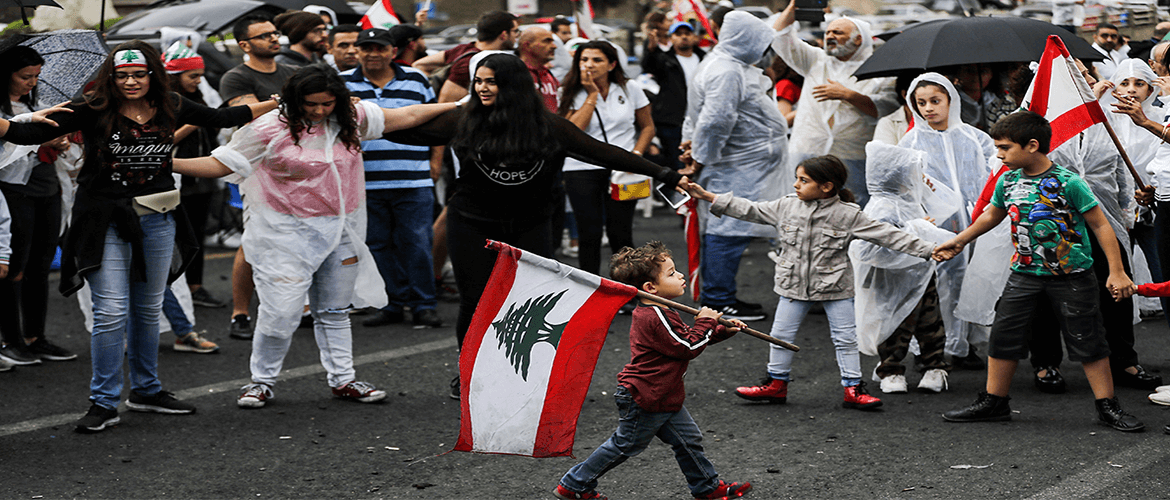Lebanon's Choice — Relapse or Revolution
September 4, 2020 | Expert Insights

Formerly referred to as the ‘Paris of the East’, Beirut was once a thriving, diverse tourist destination. The capital, as well as the rest of Lebanon with over 18 religious and ethnic groups, attracted visitors from across the world. However, after the 1975 Civil War, the country suffered internal mass displacement, an exodus of its Jewish population, and loss of tourism that crippled the economy. The country today is ridden with conflict amongst its various groups, mainly, Sunni Muslims, Shia Muslims, and Maronite Christians.
Religious tension seeps into the region’s politics, as each group’s differing alliances and hold on government affairs leads to conflict. But one extremist militant group, in particular, Hezbollah, holds exceptional influence over the majority of the country’s Shia Muslims. Hezbollah generally represents Iran’s interests, while opposing Israel. According to a 2014 Pew Research Center study, 86 per cent of Shia Muslims view the group favourably, while only 31 per cent of Sunni Muslims and 31 per cent of Christians in Lebanon feel the same.
Over the years, Hezbollah's emphasis on the militant rule has led to a neglect of civilian issues, which in turn has eroded Lebanon’s economy and politics. This ongoing economic and political crisis precipitated the country’s October revolution last year. Now, the catastrophic explosion in Beirut on August 4 and the subsequent resignation of the Lebanese government have left the country in a state of emergency. With such issues in addition to the global pandemic, the country would require large-scale international assistance to bounce back. However, even that is not enough – Lebanon needs a long-term plan to hold its corrupt leaders accountable, end the reign of warlords, and restore the international rule of law.
GATHERING THE PIECES
The explosions, caused by hazardous storage of ammonium nitrate in a warehouse at the port, led to over 170 deaths, 6,000 injured, and losses amounting to over $15 billion. Shipped from Georgia, the flammable substance was meant for an explosives manufacturing company in Mozambique. However, the shipment ended up in Beirut and remained there due to officials’ oversight for six years, until the explosion.
As enraged citizens flood the streets of Lebanon threatening the administration for its grave negligence, the situation is an echo of the October 2019 protests calling for the overthrow of the corrupt political class. Although the prior protests led to the resignation of former Prime Minister Saad Hariri, the current political crisis draws on the larger issue of deep-rooted structural incompetency. The government’s mismanagement of the economy has led to unemployment, hyperinflation, and high government debt to the extent that the public is struggling to gain basic necessities. Moreover, the administration is run by a small group of self-serving elites from the country’s dominant religious and militant groups.
As a result, the protesters are demanding an administration constituting civil society members and technocrats, completely disassociated from the current leaders. The citizens’ mass mobilisation was proven effective to some extent because it pressured Prime Minister Hassan Diab and his entire Cabinet to resign. However, without strong leadership during such a pivotal period, it is uncertain whether the country can provide food and medical assistance to those affected by both the blast and the pandemic. The explosion has disrupted supply chains and resulted in overcrowded hospitals, leaving Lebanon in dire need of international assistance.
REBUILDING A BROKEN SYSTEM
Although the UK, Australia, Germany, and France have pledged aid, Lebanon would have to cut ties from controversial militant groups like Hezbollah to gain further support from world leaders. Such conditional aid, however, was not very effective when the international community pledged billions of dollars to war-torn Lebanon in 2018 and did not witness any substantial reforms. Moreover, the present situation renders immediate elections and large-scale political reform unlikely, increasing the angst of the poor and the homeless.
The rehabilitation plan should be two-pronged — immediate humanitarian intervention and long-term political restructuring. The former can be tackled with consistent international aid, while the latter would require immense planning and training to empower civil society to take on administrative roles.
However, such implementation is challenging without a strong and centralised administration because it might drive dissent amongst the various factions in the country. The incident is already leading to clashes among dominant sects as some members from the Sunni population are blaming anti-Israel Hezbollah and their Shia supporters for the explosion. Sceptics consider whether Israel attempted to attack Hezbollah by targeting the warehouse, inadvertently leading to the deadly blast — although this is yet to be verified. Moreover, it was the Hezbollah authorities that commanded the port and arguably attempted to escape culpability by resigning from the administration.
Nevertheless, the Beirut explosion has certainly awakened the public’s political consciousness. As long as the people can sustain a united front against the corrupt administration and continue demanding reform, international actors are more likely to aid Lebanon’s path to recovery.
Assessment
- Lebanon’s ability to gain international assistance is contingent on its commitment to reform. A prerequisite would be diminishing the powers of warlords and oligarchs. However, history does not offer much hope for anything of this kind happening in the near future. Lebanon would have to choose its next leader carefully, for its own survival, over deep-seated religious and ethnic affiliations.
- Only an effective international package can rescue Beirut from the morass it has found itself in. But then, with the death grip of Hezbollah on the body politics, few western nations are really going to invest much on the recovery efforts if they will only make the anti-west extremist group even more entrenched.
- Herein lies an opportunity for the other regional players- Iran and Russia- to step into the vacuum. But sadly, the pandemic, its economic fallout, sanctions and falling oil prices do not place these potential benefactors very strongly in a position to loosen their purse strings.








Comments